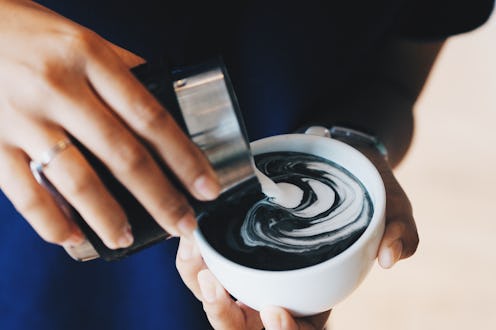Style
Charcoal Might Be The Wellness Trend Of 2019, But This Is When To Avoid It

Health care fads come and go, but some seem to stick around. Activated charcoal is one such trend. Activated charcoal — a type of carbon that has been treated so its particles become porous at the surface — has been spotted in everything from lattes to face masks, but what does it actually do? And is charcoal in food and drink actually bad for you? What about skincare and toothpaste? Here's what you need to know about how to use charcoal safely.
Food & drink
There has been a noticeable rise in popularity when it comes to charcoal in our food and drink. From trendy cafés serving charcoal lattes to health foods stores with charcoal water, it seems like we can't get away from the stuff. So just why has it become so popular?
"In my opinion, the rise in the use of activated charcoal in foods and drinks is coincidental with the rise in awareness of how toxic our world has become," explains Lisa Borg, nutritionist at pulselightclinic.co.uk. "Activated Charcoal has an enormous capacity to absorb toxins and is therefore useful in cases of poisoning."
Lisa also attributes the rise in popularity of charcoal with "the culture of quick-fix remedies" that we have become so accustomed to.
The main benefit of eating or drinking charcoal occurs in the digestive system, particularly if you are prone to bloating. "Taking activated charcoal during periods of digestive upset (e.g. bloating, acid reflux, food poisoning, nausea caused by excess alcohol intake etc.) can be helpful as a one-off remedy," says Borg.
But are there any potential drawbacks when it comes to ingesting charcoal? Borg warns that charcoal should only ever be used as a short-term fix, rather than a long-term remedy. In the long run, charcoal can "cause dehydration and subsequent constipation, absorb nutrients if taken within a couple of hours of food intake, and, in rare cases, can cause a blockage in the bowel." It also has the ability to interfere with certain medications, so it's definitely worth checking with a doctor first.
Toothpaste
One fairly common use for charcoal in recent years has been to clean teeth. Borg believes "it has a high capacity for absorption, and can help prevent tooth decay, tooth discolouration, bad breath, and gum disease." But others would disagree.
While potentially effective for reducing surface stains on teeth, charcoal can actually cause more harm than good in some cases. The British Dental Journal found that charcoal fails to provide protection from tooth decay. The review also struggled to find much scientific evidence that charcoal has healthy benefits in toothpaste.
For this reason, it's probably best to stick to regular toothpaste, and tag in your charcoal toothpaste every now and again. “Activated charcoal can be used as a supplement to brushing with regular toothpaste for people who are seeking a whiter smile, but it cannot be used in place of it,” cosmetic dentist Gregg Lituchy told Harper's Bazaar. “Regular toothpaste gives us the fluoride we need to fight dental decay so it’s necessary to keep it as part of a daily regimen.”
Skin
While ingesting charcoal and using it on your teeth may have potential to create more harm than good, skincare appears to be one way you can use charcoal relatively risk-free. Charcoal is particularly excellent for oily or acne prone skin, as it absorbs oil and dries breakouts. It acts as a detoxifying treatment for skin, and gives an extra hit of TLC.
Activated charcoal is essentially carbon, which acts like a magnet to draw out impurities from skin. "When dirt and oil in your pores come in contact with the carbon, they stick to it and then get washed away when you rinse," cosmetic chemist Ni'Kita Wilson told Allure. In short, charcoal is an excellent skincare ingredient, and masks like the ones by Boscia are worth a try. Just be careful if you have sensitive skin, and stick to charcoal wash off masks rather than peel-off ones, which can be harsh on skin.
This article was originally published on